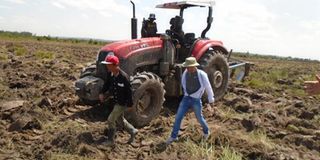Agriculture minister outlines priority areas for the sector

Sustainable employment. Many experts argue that government should invest in the agricultural value chain to create sustainable employment opportunities. File photo
Vincent Ssempijja was recently appointed the Minister of Agriculture, Animal Industry and Fisheries. Previously, he served as state minister for agriculture.
During an interview with Seeds of Gold, he spoke on a number of issues in the agriculture sector that would be considered as priority areas.
Sempijja believes increased government funding of agriculture would promote the sector, which is key growth driver.
“In the 2016/2017 budget, agencies such as National Agricultural Research Organisation (NARO), Uganda Coffee Development Authority (UCDA) and Dairy Development Authority (DDA) got an increase in the vote. I am certain that we are going to perform better.”
He adds three important elements to emphasise: Ensure food security in homesteads, assure farmers of incomes from doing agriculture as a business, and increase agricultural exports through encouraging value addition.
Production
The minister says that they will take a critical look at factors, which stimulate agricultural production.
“We shall ensure that there are only quality inputs on the market. We need to increase fertliser usage from the current two to five per cent,” he says.
“Government shall also help farmers on irrigation so they produce throughout the year.”
Also, the farmers shall be helped to form producer/farm organisations so they produce for the market.
These would enable them acquire the skills to compete with other farmers globally.
Value addition
The minister says government will attract entrepreneurs into agro-processing.
This, he explains, would be done through offering incentives such as tax reductions or tax holidays.
“Private-public partnerships need to be created because agriculture is mainly privately practised in this country. Government will facilitate private individuals into value-addition.”
Agricultural extension
The current number of extension staff has limited the application of research and new knowledge by farmers.
So, according to Ssempijja, the ministry will recruit extension staff in the next three years to cover all sub-counties.
“This will help farmers plan what he/she can grow, where and when for higher returns,” he says.
Youth in agriculture
To increase production, Ssempijja says, youth, who constitute a bigger percentage of the population will have to be drawn into agriculture.
This will not only increase production but also give employment to the youth. In addition, they will be assisted to access credit support through the Youth Livelihood Programme (YLP).
This will help them to set up agricultural enterprises as well as form groups that can undertake projects that can change their lives.
Mechanisation
To boost production, the minister says mechanisation will be given priority.
“Already there are some tractors that have been given to farmers through the Prime Minister’s office and through Naads,” he notes.
“We shall make an assessment of how these tractors are being used so that we can forge the way forward. However, we are also looking at the Indian model of using small tractors like the walking tractors, which are appropriate for youth and women.”




